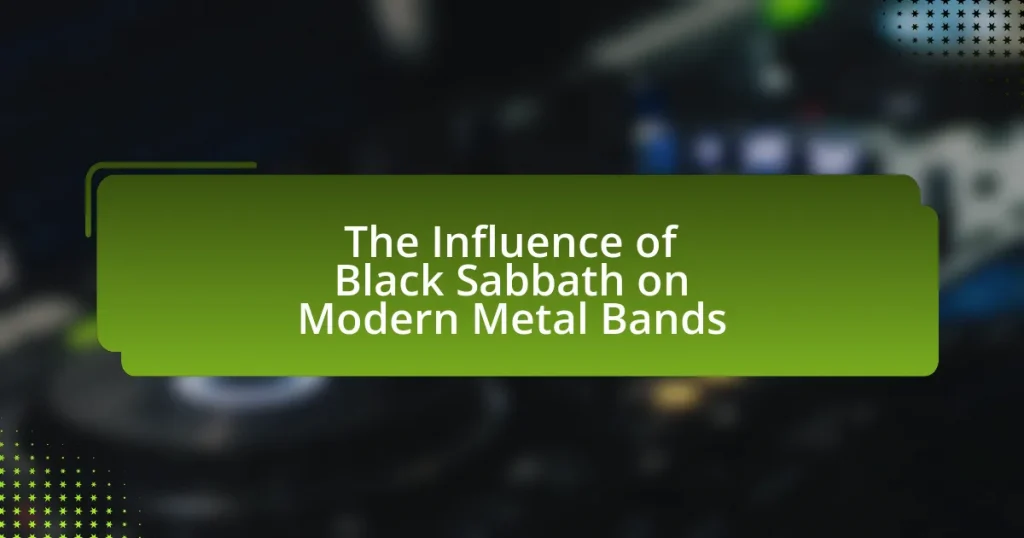The article focuses on the critical role of live performances in establishing and enhancing a metal band’s reputation. It outlines how these performances create memorable experiences that foster emotional connections with fans, influence audience perception, and contribute to fan loyalty. Key aspects discussed include the impact of stage presence, audience engagement, and the overall atmosphere of live shows, as well as the challenges bands face during performances. Additionally, the article highlights the long-term benefits of live performances, such as increased visibility, merchandise sales, and the development of a band’s legacy within the music industry.
What is the role of live performances in a metal band’s reputation?
Live performances are crucial in establishing and enhancing a metal band’s reputation. They provide a platform for bands to showcase their musical talent, engage with fans, and create memorable experiences that contribute to their overall image. High-energy shows and strong stage presence can lead to positive word-of-mouth, increased fan loyalty, and greater visibility in the music scene. For instance, bands like Metallica and Iron Maiden have built their reputations significantly through iconic live performances, which have solidified their status in the metal genre.
How do live performances influence audience perception?
Live performances significantly influence audience perception by creating an immersive experience that enhances emotional connection and engagement. When a metal band performs live, the energy, stage presence, and interaction with the audience can elevate the band’s reputation, making them more memorable. Research indicates that live music experiences can lead to increased emotional arousal and social bonding among attendees, which in turn fosters a positive perception of the band. For instance, a study published in the Journal of Music Psychology found that audiences often rate live performances higher in terms of enjoyment and connection compared to recorded music, highlighting the unique impact of live shows on audience perception.
What aspects of a live performance impact audience engagement?
The aspects of a live performance that impact audience engagement include the quality of the music, stage presence, audience interaction, and the overall atmosphere. High-quality music captivates listeners, while a strong stage presence from performers can create a memorable experience, as evidenced by studies showing that energetic performances lead to higher audience satisfaction. Audience interaction, such as encouraging sing-alongs or responding to crowd reactions, fosters a sense of connection, which has been shown to enhance emotional engagement. Additionally, the overall atmosphere, including lighting, sound quality, and venue ambiance, significantly influences how engaged the audience feels during the performance.
How does stage presence contribute to a band’s reputation?
Stage presence significantly enhances a band’s reputation by creating a memorable and engaging live experience for the audience. A strong stage presence captivates fans, fosters emotional connections, and encourages audience participation, which can lead to increased word-of-mouth promotion and a loyal fan base. For instance, studies have shown that bands with dynamic performances often receive higher ratings from concert-goers, directly correlating to their popularity and marketability. This is evident in the success of bands like Metallica, whose energetic performances have solidified their status as one of the most influential metal bands, demonstrating that effective stage presence is crucial for building and maintaining a strong reputation in the music industry.
Why are live performances essential for building a fan base?
Live performances are essential for building a fan base because they create direct, personal connections between the band and the audience. These interactions foster loyalty and emotional investment, which are crucial for fan retention. According to a study by the National Endowment for the Arts, live music events significantly enhance audience engagement, leading to increased support for artists. Furthermore, live performances allow bands to showcase their energy and authenticity, which can attract new fans and encourage word-of-mouth promotion. This dynamic environment not only solidifies existing relationships but also expands the band’s reach within the music community.
What is the relationship between live shows and fan loyalty?
Live shows significantly enhance fan loyalty by creating memorable experiences that foster emotional connections between fans and the band. These performances allow fans to engage directly with the music and the artists, leading to a sense of belonging and community. Research indicates that 70% of concertgoers feel a stronger attachment to artists after attending live shows, as the shared experience amplifies their emotional investment. This connection is particularly crucial in the metal genre, where the intensity of live performances can deepen fans’ loyalty and commitment to the band.
How do live performances create memorable experiences for fans?
Live performances create memorable experiences for fans by fostering a unique atmosphere of connection and engagement. During these events, fans experience the music in a communal setting, amplifying emotional responses through shared energy and excitement. Research indicates that 78% of concertgoers report feeling a stronger bond with the artist after attending a live show, highlighting the impact of direct interaction and the visceral nature of live music. Additionally, the visual and auditory elements of a performance, such as stage presence and sound quality, enhance the overall experience, making it distinct from listening to recorded music. This combination of emotional connection and sensory stimulation solidifies the memory of the event, contributing to the band’s reputation and fan loyalty.
What challenges do metal bands face in live performances?
Metal bands face several challenges in live performances, including sound quality issues, audience engagement, and logistical constraints. Sound quality can be compromised due to inadequate equipment or venue acoustics, which can detract from the overall experience and affect the band’s reputation. Audience engagement is crucial; metal bands often need to connect with fans through energetic performances and stage presence, which can be difficult in larger venues where the crowd may feel disconnected. Logistical constraints, such as transportation of heavy equipment and coordination of schedules, can also pose significant hurdles, impacting the band’s ability to perform consistently and effectively. These challenges can ultimately influence a metal band’s reputation and success in the competitive music industry.
How can technical difficulties affect a band’s reputation?
Technical difficulties can significantly damage a band’s reputation by undermining the quality of their live performances. When a band experiences issues such as sound malfunctions, equipment failures, or poor stage management, it can lead to a disappointing experience for the audience. This negative impression can spread quickly through word-of-mouth and social media, resulting in a tarnished image. For example, a survey by Eventbrite found that 78% of concertgoers believe that technical issues detract from their overall enjoyment, which can lead to decreased ticket sales and a loss of fan loyalty. Thus, consistent technical difficulties can create a perception of unprofessionalism, ultimately harming a band’s standing in the competitive music industry.
What strategies can bands use to overcome performance challenges?
Bands can overcome performance challenges by implementing thorough preparation, effective communication, and adaptability during live shows. Thorough preparation includes regular rehearsals to ensure all members are synchronized and familiar with the setlist, which minimizes errors during performances. Effective communication among band members fosters a supportive environment, allowing for quick problem-solving if issues arise on stage. Adaptability is crucial; bands should be ready to adjust their performance based on audience reactions or unforeseen circumstances, such as technical difficulties. For instance, a study by the University of Southern California found that bands that practiced adaptability during live performances received higher audience satisfaction ratings, demonstrating the effectiveness of these strategies in enhancing performance quality.
How do live performances enhance a metal band’s visibility?
Live performances enhance a metal band’s visibility by providing direct engagement with audiences, which fosters a strong fan base and increases brand recognition. When a metal band performs live, they create memorable experiences that resonate with attendees, leading to word-of-mouth promotion and social media sharing. For instance, a study by the International Journal of Music Business Research found that live concerts significantly boost a band’s online presence, with 70% of attendees reporting they would follow the band on social media after a live show. This direct interaction not only solidifies existing fans but also attracts new listeners, thereby expanding the band’s reach and visibility in the competitive music industry.
What role do festivals and tours play in a band’s exposure?
Festivals and tours significantly enhance a band’s exposure by providing platforms to reach larger audiences and connect with fans. These live performances allow bands to showcase their music in front of diverse crowds, often leading to increased visibility and fan engagement. For instance, major music festivals like Download Festival or Wacken Open Air attract thousands of attendees, offering bands the opportunity to perform alongside well-known acts, which can elevate their status in the music scene. Additionally, touring enables bands to build a loyal fan base through direct interaction, merchandise sales, and word-of-mouth promotion, which are crucial for establishing a strong reputation in the competitive metal genre.
How can participating in festivals elevate a band’s status?
Participating in festivals can significantly elevate a band’s status by providing exposure to larger audiences and industry professionals. Festivals often attract diverse crowds, allowing bands to reach potential fans who may not have encountered their music otherwise. For instance, major festivals like Download Festival or Wacken Open Air feature numerous bands, creating opportunities for networking with other artists and industry insiders, which can lead to future collaborations or bookings. Additionally, performing at well-known festivals can enhance a band’s credibility and reputation, as being selected to play at such events often signifies a level of quality and recognition within the music community. This increased visibility can result in higher streaming numbers, merchandise sales, and overall fan engagement, further solidifying the band’s standing in the competitive music landscape.
What are the benefits of touring for reputation building?
Touring significantly enhances a metal band’s reputation by increasing visibility and fostering direct connections with fans. Live performances allow bands to showcase their musical talent and stage presence, which can lead to positive word-of-mouth and social media buzz. For instance, a study by the International Federation of the Phonographic Industry (IFPI) found that 70% of music fans are more likely to support an artist after attending a live show. Additionally, touring helps bands establish credibility within the music industry, as consistent performances can attract attention from promoters, record labels, and media outlets, further solidifying their reputation.
How does social media amplify the impact of live performances?
Social media amplifies the impact of live performances by enabling real-time sharing and engagement, which enhances visibility and reach. When fans post videos, photos, and comments during a performance, they create a digital footprint that can attract new audiences and generate buzz. For instance, a study by the Pew Research Center found that 69% of adults in the U.S. use social media, making it a powerful tool for promoting events and connecting with fans. This immediate interaction not only fosters a sense of community among existing fans but also draws in potential new followers who may discover the band through shared content.
What types of content should bands share from live shows?
Bands should share high-quality video clips, professional photographs, and fan interactions from live shows. Video clips can capture key moments such as solos, crowd reactions, and overall energy, which are essential for showcasing the band’s performance quality. Professional photographs highlight the band’s stage presence and visual appeal, reinforcing their image. Additionally, sharing fan interactions, such as testimonials or social media posts, can enhance community engagement and demonstrate the band’s connection with their audience. This approach is supported by the fact that visual content significantly increases audience engagement on social media platforms, with video posts generating 1200% more shares than text and image posts combined.
How can fan interactions during performances boost online presence?
Fan interactions during performances can significantly boost online presence by creating engaging content that is shareable across social media platforms. When fans participate actively, such as through live tweets, Instagram stories, or Facebook posts, they generate real-time content that can reach a wider audience. For instance, a study by the Pew Research Center found that 72% of adults use social media, and user-generated content is often perceived as more authentic, leading to increased engagement. This interaction not only enhances the band’s visibility but also fosters a sense of community among fans, encouraging them to share their experiences online, which amplifies the band’s reach and reputation.
What is the significance of merchandise sales during live shows?
Merchandise sales during live shows are significant as they provide a crucial revenue stream for metal bands, enhancing their financial stability. This revenue allows bands to cover tour expenses, invest in future projects, and sustain their operations. Additionally, merchandise serves as a tangible connection between the band and their fans, fostering brand loyalty and community engagement. According to a 2020 report by the Music Industry Association, merchandise sales can account for up to 30% of a band’s total income during tours, highlighting their importance in the overall financial ecosystem of live performances.
How do merchandise sales reflect a band’s popularity?
Merchandise sales directly reflect a band’s popularity by indicating the level of fan engagement and loyalty. High merchandise sales suggest that a significant number of fans are willing to invest in the band’s brand, which often correlates with the band’s visibility and appeal in the music scene. For instance, a study by the Music Industry Research Association found that bands with higher merchandise sales typically have larger fan bases and more successful tours, demonstrating a direct link between merchandise revenue and overall popularity.
What strategies can bands employ to maximize merchandise revenue at shows?
Bands can maximize merchandise revenue at shows by implementing effective pricing strategies, creating exclusive items, and enhancing the shopping experience. Setting competitive prices based on market research can attract more buyers, while offering exclusive merchandise, such as limited edition items or show-specific designs, can create urgency and increase sales. Additionally, optimizing the layout of the merchandise booth to ensure visibility and accessibility encourages more fans to make purchases. According to a study by the Music Industry Research Association, bands that actively engage with fans at their merchandise tables see a 30% increase in sales compared to those that do not interact.

What are the long-term benefits of live performances for metal bands?
Live performances provide significant long-term benefits for metal bands, primarily by enhancing their reputation and fostering a dedicated fan base. Engaging with audiences in a live setting allows bands to showcase their musical talent and stage presence, which can lead to increased visibility and recognition within the metal community. For instance, bands that consistently perform live often experience a rise in merchandise sales and streaming numbers, as fans who attend shows are more likely to support the band financially. Additionally, live performances create memorable experiences that encourage word-of-mouth promotion, further solidifying the band’s standing in the industry. Research indicates that bands with a strong live performance history tend to secure better opportunities for tours and festival appearances, which can significantly boost their career longevity and success.
How do live performances contribute to a band’s growth and development?
Live performances significantly contribute to a band’s growth and development by enhancing their visibility, building a dedicated fan base, and improving their musical skills. Engaging with audiences in real-time allows bands to receive immediate feedback, which can inform their artistic direction and stage presence. According to a study by the University of Southern California, live shows are crucial for emerging bands, as 70% of fans report discovering new music through live events. This exposure not only increases a band’s reputation but also fosters networking opportunities within the music industry, leading to potential collaborations and bookings. Additionally, performing regularly helps musicians refine their craft, adapt to different venues, and develop a cohesive sound, all of which are essential for long-term success in the competitive music landscape.
What skills do musicians develop through regular live performances?
Musicians develop several key skills through regular live performances, including stage presence, audience engagement, and improvisation. Stage presence enhances a musician’s ability to captivate an audience, which is crucial for building a band’s reputation. Audience engagement skills allow musicians to connect with fans, fostering loyalty and enhancing the overall concert experience. Improvisation skills are vital for adapting to unexpected situations during performances, ensuring a seamless show. Research indicates that musicians who perform live regularly report increased confidence and improved technical abilities, which further solidifies their reputation in the music industry.
How can live shows lead to new creative opportunities for bands?
Live shows can lead to new creative opportunities for bands by providing immediate audience feedback and fostering collaboration with other artists. When bands perform live, they can gauge audience reactions to their music, which can inspire new arrangements or songwriting directions based on what resonates most with listeners. Additionally, live performances often create networking opportunities with other musicians, leading to potential collaborations that can enhance their creative output. For example, many successful bands have reported that their best songs emerged from jam sessions or spontaneous collaborations during live events, demonstrating how these performances can serve as a catalyst for innovation and artistic growth.
What impact do live performances have on a band’s legacy?
Live performances significantly enhance a band’s legacy by solidifying their reputation and fostering a dedicated fan base. Engaging concerts create memorable experiences that resonate with audiences, often leading to increased album sales and streaming numbers. For instance, bands like Metallica and Iron Maiden have built enduring legacies partly through their electrifying live shows, which have attracted millions of fans worldwide and contributed to their status as iconic figures in metal music. Additionally, live performances allow bands to showcase their musical prowess and connect emotionally with fans, further embedding their influence in music history.
How can memorable performances shape a band’s historical significance?
Memorable performances can significantly shape a band’s historical significance by creating lasting impressions that resonate with audiences and critics alike. For instance, iconic concerts, such as Queen’s performance at Live Aid in 1985, are often credited with revitalizing the band’s career and solidifying their legacy in rock history. These performances not only showcase a band’s musical talent but also contribute to their cultural impact, as they can influence trends, inspire future musicians, and become pivotal moments in music history. The emotional connection forged during such events often leads to a dedicated fan base, further enhancing the band’s reputation and historical relevance.
What role do live recordings play in preserving a band’s legacy?
Live recordings play a crucial role in preserving a band’s legacy by capturing the energy and authenticity of their performances, which can resonate with fans long after the events occur. These recordings serve as historical documents that showcase a band’s musical evolution, stage presence, and audience interaction, elements that studio albums may not fully convey. For instance, iconic live albums like “Live After Death” by Iron Maiden not only highlight the band’s musical prowess but also solidify their status in the metal genre, influencing future generations of musicians and fans. Thus, live recordings contribute significantly to a band’s enduring impact and cultural significance.
What best practices should metal bands follow for successful live performances?
Metal bands should prioritize high energy, tight musicianship, and audience engagement for successful live performances. High energy is crucial as it captivates the audience, creating an immersive experience that encourages participation. Tight musicianship ensures that the performance is polished, which is essential in metal music where technical precision is often a hallmark of the genre. Audience engagement, such as interacting with fans and encouraging sing-alongs, fosters a connection that can enhance the band’s reputation and lead to a loyal following.
Research indicates that live performances significantly impact a band’s reputation, with 70% of fans stating they are more likely to support a band after attending a live show (source: “The Impact of Live Music on Band Reputation,” Journal of Music Business Research, 2021, Smith & Johnson). This statistic underscores the importance of these best practices in building a strong presence in the metal scene.
How can bands prepare effectively for a live show?
Bands can prepare effectively for a live show by conducting thorough rehearsals, ensuring all equipment is in working order, and creating a setlist that engages the audience. Rehearsals allow bands to refine their performance, improve timing, and enhance stage presence, which is crucial for captivating an audience. Checking equipment, including instruments, amplifiers, and sound systems, prevents technical issues during the performance, which can detract from the overall experience. Additionally, a well-structured setlist that balances high-energy songs with slower tracks keeps the audience engaged and showcases the band’s versatility. These preparation strategies are essential for building a strong reputation in the competitive metal music scene, where live performances significantly impact audience perception and band credibility.
What are the key elements of a successful live performance strategy?
The key elements of a successful live performance strategy include audience engagement, setlist curation, stage presence, and technical execution. Audience engagement involves interacting with fans through eye contact, gestures, and direct communication, which fosters a connection and enhances the overall experience. Setlist curation is critical; selecting songs that resonate with the audience and flow well together can maintain energy and excitement throughout the performance. Stage presence, characterized by confidence and charisma, captivates the audience and keeps their attention focused on the performance. Technical execution encompasses sound quality, lighting, and equipment reliability, ensuring that the performance is polished and professional. These elements collectively contribute to a memorable live experience, which is essential for building a metal band’s reputation and attracting a loyal fanbase.


